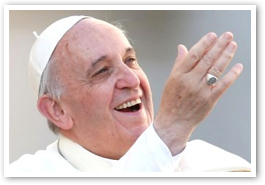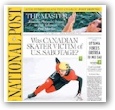Pope Francis' Ecological Encyclical
- FATHER RAYMOND J. DE SOUZA
It's integration that he proposes — God and man, the rich and the poor, the natural world with the world of work and industry.
 Pope Francis' ecological encyclical will call for globally coordinated state action to mitigate climate change. His papal environmentalism is both traditional — rooted in the teaching of his predecessors, with the text littered with citations to Benedict XVI and John Paul II — and radical, taking its starting point from the gospel emphasis on the poor as preferential subjects of God's love.
Pope Francis' ecological encyclical will call for globally coordinated state action to mitigate climate change. His papal environmentalism is both traditional — rooted in the teaching of his predecessors, with the text littered with citations to Benedict XVI and John Paul II — and radical, taking its starting point from the gospel emphasis on the poor as preferential subjects of God's love.
If his climate-change position will earn the laudations of the international progressive elite, the priority on the rights of the poor will sharply challenge the social liberalism the same elite imposes upon them.
We'll know for certain on Thursday, when the text is released. I had planned to write about what the major themes would likely be, but on Monday the magazine L'espresso published the entire document in Italian.
The Vatican press office denounced the breaking of the embargo as "heinous" and described the leaked document as only a draft. A leading Catholic news service, Crux, referred to the text as a "leaked draft," but offered a commentary upon it, indicating that most Vatican commentators believe a "draft" this close to publication date is almost certainly the actual text.
So while confirmation will have to await Thursday's release, the broad outlines and major headlines are no longer subjects of speculation. (Quotations to follow are my translations.)
Entitled Laudato Si', Francis' encyclical was highly anticipated — by the UN, by the Nobel committees, by environmental activists the world over — as the remaking of the Catholic Church in the image of Al Gore. It turns out that the Pope sees himself in the image of St. Francis, a man who sought to look at the world as Jesus did, as a poor man at home with the poor.
The political headline will be that Pope Francis largely accepts that the climate is getting warmer due to human activity. Indeed, the Pope has been saying for months that he wished this encyclical to influence the UN climate change conference to be held this year.
"Unfortunately, many efforts to finds solutions to the environmental crisis are often frustrated not only by the refusals of the powerful, but also the lack of interest by others," the text reads.
At some 192 pages, the text covers everything from pollution and parks to technology and architecture. It ties all this together in a manner that is distinctively Franciscan — meaning both the saint and the pope. The environment has to be understood above all in terms of the "intimate relation between the poor and the fragility of the planet" and "the conviction that the whole world is intimately connected."
The intimate connection is that offered by the biblical wisdom open to Jews, Christians and Muslims, namely that there is threefold harmony that includes God, mankind and the natural world. Notes of "disharmony" in one relationship bring disharmony in others. Thus, a world that forgets God is soon to degrade nature. A degraded nature disrupts the relationships between people.
Here he develops the argument that an economic structure built on convenience and disposability treats inconvenient people as disposable; the text therefore denounces both abortion and the population control programs so beloved by many in the environmental movement.
And it is these broken relationships that drive the analysis in the text. Since the beginning of his pontificate Francis has denounced what he calls a "throwaway culture" where the poor, the elderly, the unborn, the unemployed, the migrant and the disabled are cast to the margins. Here he develops the argument that an economic structure built on convenience and disposability treats inconvenient people as disposable; the text therefore denounces both abortion and the population control programs so beloved by many in the environmental movement.
Two examples indicate how Francis' environmentalism is as much about preference for the poor as it is protection of nature. The text speaks of access to potable water as an issue of "primary" importance, though one rarely thought about in rich countries. If the political impact of Laudato Si' concerns climate treaties for 2030 and not clean water for next year, it will not reflect the Pope's priorities.
A second illuminating example is that of urban living. The text observes that many sprawling cities have become nearly unlivable as they literally choke on pollution. The poor are often excluded from green spaces, which have been privatized by the wealthy. That's a different way to think about the harmony between nature and human relationships, and leads to surprising conclusions. For example, the poor in the world's financial centres, New York and London, have ready access to vast parks on an equal basis with the rich, while in Beijing the rich pay to breathe different air than the poor do.
Francis calls it "integral ecology," which is the term he uses alongside "sustainable development." It's integration that he proposes — God and man, the rich and the poor, the natural world with the world of work and industry. On Thursday we'll be able to read that proposal in English too.
 This is Meaghen Gonzalez, Editor of CERC. I hope you appreciated this piece. We curate these articles especially for believers like you.
This is Meaghen Gonzalez, Editor of CERC. I hope you appreciated this piece. We curate these articles especially for believers like you.
Please show your appreciation by making a $3 donation. CERC is entirely reader supported.

Acknowledgement
 Father Raymond J. de Souza, "Planet, poor are vulnerable, encyclical says." National Post, (Canada) June 16, 2015.
Father Raymond J. de Souza, "Planet, poor are vulnerable, encyclical says." National Post, (Canada) June 16, 2015.
Reprinted with permission of the National Post and Fr. de Souza.
The Author
Father Raymond J. de Souza is the founding editor of Convivium magazine.
Copyright © 2015 National Post



